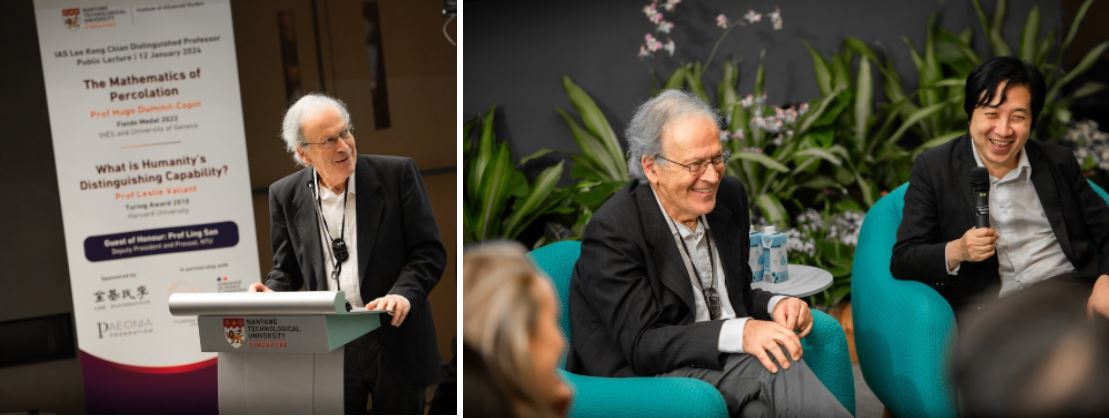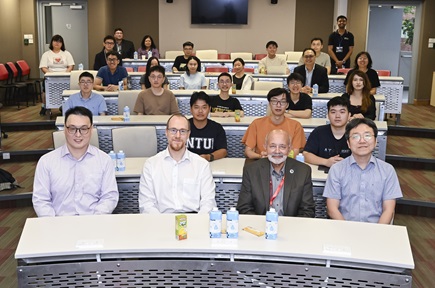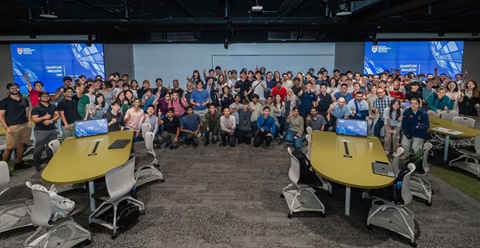Lee Kong Chian Distinguished Professor Public Lecture by Fields Medalist and Turing Award laureate
Shivam Mahajan | Research Fellow, School of Physical and Mathematical Sciences, NTU
On 12 January 2024, the Institute of Advanced Studies (IAS) at Nanyang Technological University hosted the Lee Kong Chian Distinguished Professor Public Lecture featuring two distinguished speakers: Prof Hugo Duminil-Copin (Fields Medallist 2022) and Prof Leslie Valiant (Turing Award laureate 2010).
The public lecture, sponsored by the Lee Foundation and Paeonia Foundation, was organised as a partner event of the National Research Foundation's Global Young Scientists Summit 2024, with support from the Embassy of France in Singapore. Prof Sum Tze-Chien, Director of IAS NTU, extended a cordial welcome to our guests and audience, followed by opening remarks from the Guest of Honour, Prof Ling San, Deputy President and Provost at NTU.
 Prof Hugo Duminil-Copin and Prof Leslie Valiant (second and third from the left) alongside Prof Ling San (fourth from the left), accompanied by NTU members. [Right photo] Mr Andy Chua, Managing Director of Paeonia Group, shaking hands with Prof Sum Tze-Chien.
Prof Hugo Duminil-Copin and Prof Leslie Valiant (second and third from the left) alongside Prof Ling San (fourth from the left), accompanied by NTU members. [Right photo] Mr Andy Chua, Managing Director of Paeonia Group, shaking hands with Prof Sum Tze-Chien.
The event provided a thorough exploration, delving into the mathematical complexities of percolation and the computational underpinnings that define the distinctive capabilities of humanity.
Prof Hugo Duminil-Copin is the Professor of Mathematics at the University of Geneva and a permanent professor at the Institut des Hautes Études Scientifiques (IHES). He highlighted the origins of the initial percolation model, tracing its inspiration back to a simple hex game in his talk titled "The Mathematics of Percolation". In this game, two players strategically alternate colouring hexagons in blue or orange, aiming to create a connected path from the left to the right side. The term "percolation" was clarified through a relatable example involving coffee and water. This analogy drew parallels between the colour of coffee grounds and the percolation process, emphasising the significance of colour, particularly when grounds are brown, acting as a barrier, or white, allowing water to filter through easily. This comparison illustrated how distinct characteristics, such as colour, influence substance flow through a material or medium, making percolation relevant for studying material porosity.
He provided an intriguing application involving the melting of polar ice caps through percolation, that leverages the density difference between water and ice. Rising temperatures cause ice to melt, creating passageways within the structure. This initiates a percolation process where liquid water permeates through openings. However, as temperatures drop, a fascinating reversal occurs. The percolated water undergoes a phase transition, refreezing and contributing to a continuous freezing-melting cycle. Percolation, influenced by polar temperature fluctuations and differing water-ice densities, significantly shapes ice cap dynamics in response to climate changes. The interplay between percolation, temperature variations, and differing densities offers a unique perspective on complex mechanisms governing polar ice cap behaviour.
 Captivating the audience, Prof Hugo Duminil-Copin delivered a compelling talk on percolation .
Captivating the audience, Prof Hugo Duminil-Copin delivered a compelling talk on percolation .
Prof Duminil-Copin clarified that the mathematical appeal of this model lies in its ability to reveal emergent properties not readily apparent through theoretical analysis alone. Despite the questionability of employing a single, simplistic model given diverse object shapes, the choice aligns with a principle expressed by Leo P. Kadanoff. Kadanoff emphasised investigating physical questions using markedly simplified models, justified by the universality property. Universality asserts that qualitative and sometimes quantitative properties persist across diverse systems. Therefore, studying the simplest model logically unveils shared properties, encouraging exploration of simplified models as a strategic entry point for comprehending broader principles governing complex physical systems. This approach offers insights into overarching properties that transcend specific contexts.
Beyond porosity and fluid flow, percolation models aid understanding in phase transitions, conductivity, communication networks, disease spread, and probabilistic graphs. Prof Hugo concluded by explaining how percolation models contribute to comprehending phase transitions in physical systems, such as the transition from a non-percolating to a percolating state at a critical point. He also elucidated the effect of dimensionality on critical exponents in these phase transitions.
Our second distinguished speaker, Prof Leslie Valiant, is the T. Jefferson Coolidge Professor of Computer Science and Applied Mathematics at Harvard University's School of Engineering and Applied Sciences. He centred his discussion on the dynamic interaction between humans and machines, accentuating their respective capabilities. Commencing his talk "What is Humanity’s Distinguishing Capability?" with a question reminiscent of Alan Turing's enquiry, he pondered whether machines could successfully replicate every task undertaken by humans. Alan Turing, addressing this question, posited that certain distinct human characteristics, such as susceptibility to sex-appeal or smoking a pipe, lay beyond machines' capabilities. In contrast, Prof Valiant maintained the belief that machines face no inherent limits in emulating such human traits. His optimistic stance suggested a broader potential for machines to replicate various human abilities, challenging rigidly defined limits on machines' capacity to emulate human behaviour.
 Prof Leslie Valiant's engaging discussion on humanity's unique capability, followed by a dynamic Q&A session moderated by Prof Gu Mile from the Division of Physics and Applied Physics at SPMS, NTU.
Prof Leslie Valiant's engaging discussion on humanity's unique capability, followed by a dynamic Q&A session moderated by Prof Gu Mile from the Division of Physics and Applied Physics at SPMS, NTU.
Prof Valiant sought to articulate the pivotal ability that propelled human civilisation, distinguishing us from other species. Merely pinpointing a distinctive trait was insufficient; the quest was for a capability that not only sets humans apart but also elucidates their achievements. Precision in this definition demanded a computational aspect, where the anticipated outcomes of the capability must be clearly defined and computationally feasible. While aligned with the goals of artificial intelligence research, this formulation diverged from being synonymous with it.
Introducing the concept of 'educability,' Prof Valiant proposed a comprehensive capability. Educability encompasses the capacity to acquire beliefs through generalising from experience, applying combinations of beliefs to specific situations, and acquiring beliefs explicitly conveyed by others, all integrated with multi-object symbolic scene analysis. On the positive side, such a capability enabled humans to make scientific advancements, share knowledge, embark on lunar missions, build computers, and advance medical science. However, on the negative side, educability could lead to absorbing instruction without the ability to verify its truth or validity, making individuals susceptible to arbitrary belief systems, ideologies, and conspiracy theories. Hence, active education is crucial to fortify individuals against traditional as well as digital propaganda.
Prof Valiant delved into additional aspects of educability, questioning whether the model challenges the concept of "singularity," where computers surpass humans. Assuring that there's no need for apprehension, he emphasised the fundamental science behind artificial intelligence, asserting our ability to comprehend its workings without hidden capabilities. While machines may excel in specific tasks, our understanding of their operations keeps everything under control. The tasks assigned to computers often align with human interests and ambitions, indicating that a deeper understanding of human capabilities has the potential to fuel future technological advancements.
In essence, the public lecture explored percolation models' origins and applications, highlighting their relevance in understanding various phenomena, and investigated the dynamic interaction between humans and machines, challenging limits on machine replication of human behaviour, proposing 'educability' as a vital human trait, with a focus on the importance of active education to counter arbitrary beliefs and drive technological advancements through a deeper understanding of human capabilities.

[From left] Prof Juan-Pablo Ortega (Division of Mathematical Sciences at SPMS, NTU), Ms Julie Blazy (Attaché for Science and Higher Education, Embassy of France in Singapore), Prof Hugo Duminil-Copin, Prof Ling San, Mr Andy Chua and Prof Sum Tze-Chien.
 [Left] Prof Ling San presented memento to Prof Leslie Valiant. [Right] Prof Valiant pictured alongside members of the Paeonia Group, French Embassy, IHES and NTU faculty.
[Left] Prof Ling San presented memento to Prof Leslie Valiant. [Right] Prof Valiant pictured alongside members of the Paeonia Group, French Embassy, IHES and NTU faculty.
Around 300 attendees were drawn to the informative and insightful talks delivered by the two distinguished professors.
"Clear communication, devoid of technical jargon, with excellent examples and analogies that provide valuable insights even for a non-technical audience."- Rion You (Research Associate, MAE NTU)
"Learned something outside my major and developed an interest in percolation."- Lim Yong Le (PhD student, IGP-NEWRI)
"I think understanding human educability as well as learning more about percolation will help greatly with my research in the future."- Lye Yu Zhe (PhD student, MAE NTU)
"The speakers' "layman" friendly way of explaining their research." - Leow Zheng Jie (Undergraduate, SPMS NTU)


.tmb-listing.jpg?Culture=en&sfvrsn=c45c3c7e_1)



